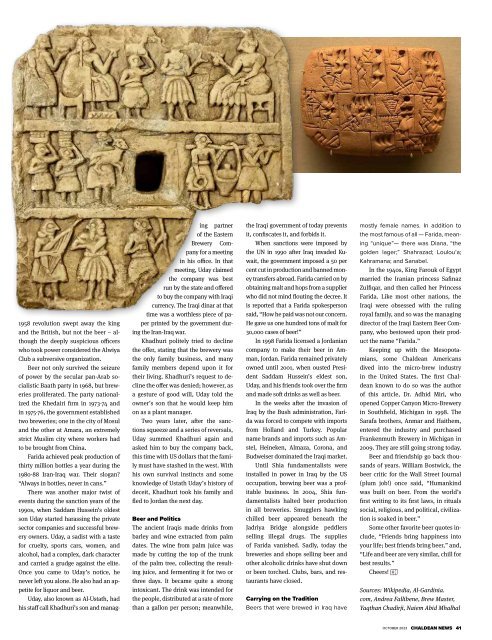You also want an ePaper? Increase the reach of your titles
YUMPU automatically turns print PDFs into web optimized ePapers that Google loves.
1958 revolution swept away the king<br />
and the British, but not the beer – although<br />
the deeply suspicious officers<br />
who took power considered the Alwiya<br />
Club a subversive organization.<br />
Beer not only survived the seizure<br />
of power by the secular pan-Arab socialistic<br />
Baath party in 1968, but breweries<br />
proliferated. The party nationalized<br />
the Khedairi firm in 1973-74 and<br />
in 1975-76, the government established<br />
two breweries; one in the city of Mosul<br />
and the other at Amara, an extremely<br />
strict Muslim city where workers had<br />
to be brought from China.<br />
Farida achieved peak production of<br />
thirty million bottles a year during the<br />
1980-88 Iran-Iraq war. Their slogan?<br />
“Always in bottles, never in cans.”<br />
There was another major twist of<br />
events during the sanction years of the<br />
1990s, when Saddam Hussein’s oldest<br />
son Uday started harassing the private<br />
sector companies and successful brewery<br />
owners. Uday, a sadist with a taste<br />
for cruelty, sports cars, women, and<br />
alcohol, had a complex, dark character<br />
and carried a grudge against the elite.<br />
Once you came to Uday’s notice, he<br />
never left you alone. He also had an appetite<br />
for liquor and beer.<br />
Uday, also known as Al-Ustath, had<br />
his staff call Khadhuri’s son and managing<br />
partner<br />
of the Eastern<br />
Brewery Company<br />
for a meeting<br />
in his office. In that<br />
meeting, Uday claimed<br />
the company was best<br />
run by the state and offered<br />
to buy the company with Iraqi<br />
currency. The Iraqi dinar at that<br />
time was a worthless piece of paper<br />
printed by the government during<br />
the Iran-Iraq war.<br />
Khadhuri politely tried to decline<br />
the offer, stating that the brewery was<br />
the only family business, and many<br />
family members depend upon it for<br />
their living. Khadhuri’s request to decline<br />
the offer was denied; however, as<br />
a gesture of good will, Uday told the<br />
owner’s son that he would keep him<br />
on as a plant manager.<br />
Two years later, after the sanctions<br />
squeeze and a series of reversals,<br />
Uday summed Khadhuri again and<br />
asked him to buy the company back,<br />
this time with US dollars that the family<br />
must have stashed in the west. With<br />
his own survival instincts and some<br />
knowledge of Ustath Uday’s history of<br />
deceit, Khadhuri took his family and<br />
fled to Jordan the next day.<br />
Beer and Politics<br />
The ancient Iraqis made drinks from<br />
barley and wine extracted from palm<br />
dates. The wine from palm juice was<br />
made by cutting the top of the trunk<br />
of the palm tree, collecting the resulting<br />
juice, and fermenting it for two or<br />
three days. It became quite a strong<br />
intoxicant. The drink was intended for<br />
the people, distributed at a rate of more<br />
than a gallon per person; meanwhile,<br />
the Iraqi government of today prevents<br />
it, confiscates it, and forbids it.<br />
When sanctions were imposed by<br />
the UN in 1990 after Iraq invaded Kuwait,<br />
the government imposed a 50 per<br />
cent cut in production and banned money<br />
transfers abroad. Farida carried on by<br />
obtaining malt and hops from a supplier<br />
who did not mind flouting the decree. It<br />
is reported that a Farida spokesperson<br />
said, “How he paid was not our concern.<br />
He gave us one hundred tons of malt for<br />
30,000 cases of beer!”<br />
In 1998 Farida licensed a Jordanian<br />
company to make their beer in Amman,<br />
Jordan. Farida remained privately<br />
owned until 2001, when ousted President<br />
Saddam Hussein’s eldest son,<br />
Uday, and his friends took over the firm<br />
and made soft drinks as well as beer.<br />
In the weeks after the invasion of<br />
Iraq by the Bush administration, Farida<br />
was forced to compete with imports<br />
from Holland and Turkey. Popular<br />
name brands and imports such as Amstel,<br />
Heineken, Almaza, Corona, and<br />
Budweiser dominated the Iraqi market.<br />
Until Shia fundamentalists were<br />
installed in power in Iraq by the US<br />
occupation, brewing beer was a profitable<br />
business. In 2004, Shia fundamentalists<br />
halted beer production<br />
in all breweries. Smugglers hawking<br />
chilled beer appeared beneath the<br />
Jadriya Bridge alongside peddlers<br />
selling illegal drugs. The supplies<br />
of Farida vanished. Sadly, today the<br />
breweries and shops selling beer and<br />
other alcoholic drinks have shut down<br />
or been torched. Clubs, bars, and restaurants<br />
have closed.<br />
Carrying on the Tradition<br />
Beers that were brewed in Iraq have<br />
mostly female names. In addition to<br />
the most famous of all — Farida, meaning<br />
“unique”— there was Diana, “the<br />
golden lager;” Shahrazad; Loulou’a;<br />
Kahramana; and Sanabel.<br />
In the 1940s, King Farouk of Egypt<br />
married the Iranian princess Safinaz<br />
Zulfiqar, and then called her Princess<br />
Farida. Like most other nations, the<br />
Iraqi were obsessed with the ruling<br />
royal family, and so was the managing<br />
director of the Iraqi Eastern Beer Company,<br />
who bestowed upon their product<br />
the name “Farida.”<br />
Keeping up with the Mesopotamians,<br />
some Chaldean Americans<br />
dived into the micro-brew industry<br />
in the United States. The first Chaldean<br />
known to do so was the author<br />
of this article, Dr. Adhid Miri, who<br />
opened Copper Canyon Micro-Brewery<br />
in Southfield, Michigan in 1998. The<br />
Sarafa brothers, Anmar and Haithem,<br />
entered the industry and purchased<br />
Frankenmuth Brewery in Michigan in<br />
2009. They are still going strong today.<br />
Beer and friendship go back thousands<br />
of years. William Bostwick, the<br />
beer critic for the Wall Street Journal<br />
(plum job!) once said, “Humankind<br />
was built on beer. From the world’s<br />
first writing to its first laws, in rituals<br />
social, religious, and political, civilization<br />
is soaked in beer.”<br />
Some other favorite beer quotes include,<br />
“Friends bring happiness into<br />
your life; best friends bring beer,” and,<br />
“Life and beer are very similar, chill for<br />
best results.”<br />
Cheers!<br />
Sources: Wikipedia, Al-Gardinia.<br />
com, Andrea Fallibene, Brew Master,<br />
Yaqthan Chadirji, Naiem Abid Mhalhal<br />
<strong>OCTOBER</strong> <strong>2023</strong> CHALDEAN NEWS 41

















